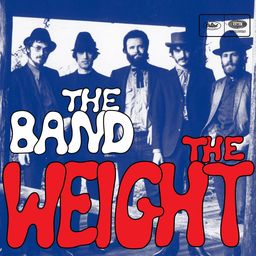What’s With “THE WEIGHT?”
Aug 10
 Robbie Robertson died! I am devastated. Not only is he everything the Times Obit said about him, he was also so damned cute! Anyway, Here’s my tribute to him. Yes, it’s a repeat, but some things bear repeating.
Robbie Robertson died! I am devastated. Not only is he everything the Times Obit said about him, he was also so damned cute! Anyway, Here’s my tribute to him. Yes, it’s a repeat, but some things bear repeating.
We all love the song “The Weight” by The Band. It’s #41 on Rolling Stone’s Greatest Songs of All Time, and makes my personal Top Ten List. I first wrote about it in 2010 and have thought about it often since then.
I still have no idea what it means.
But in an effort to ignore the widening woes of the world, I tried again to uncover the hidden meaning of The Weight.
So here goes:
I pulled into Nazareth, I was feelin’ about half past dead;
I just need some place where I can lay my head.
Okay, for starters I always thought that Nazareth was Biblical, but it turns out (according to Wikipedia) that it’s a town in Pennsylvania. Go figure.
We do get that the the guy’s tired, but “half-past dead.” How brilliant is that?
Then he finds someone who he hopes can help:
Hey, mister, can you tell me where a man might find a bed?”
He just grinned and shook my hand, and “No!”, was all he said.
Okay, it’s clear that Tired Guy is looking for a place to stay, and he’s getting no for an answer.
But then comes the famous chorus, where the plot begins to thicken . . .
Take a load off Fanny, take a load for free;
Take a load off Fanny, And (and) (and) you can put the load right on me.
I always heard it as “Manny,” not “Fanny” or”Fannie” as it’s sometimes written, but that’s a minor detail. I also assumed that “take a load” was a hit off a joint (Hey, this was from the sixties!) but most people think it just means: You help me out, I’ll help you out. Whatever. Anyway, now it gets really complicated:
I picked up my bag, I went lookin’ for a place to hide;
When I saw Carmen and the Devil walkin’ side by side.
I said, “Hey, Carmen, come on, let’s go downtown.”
She said, “I gotta go, but m’friend can stick around.”
Who the hell is Carmen? And why is she walking with the devil, and is she telling the traveler to go to hell or just being friendly?
In the next stanza we meet two or three more characters: Miss Moses (Miss Carmen Moses? Or are they two different people?) and Luke (this must be Biblical), plus our new BFF, Anna Lee. Listen up:
Go down, Miss Moses, there’s nothin’ you can say
It’s just ol’ Luke, and Luke’s waitin’ on the Judgment Day.
“Well, Luke, my friend, what about young Anna Lee?”
He said, “Do me a favor, son, woncha stay an’ keep Anna Lee company?”
After the chorus (featuring Fanny/Fannie or Manny again), yet another character is introduced:
Crazy Chester followed me, and he caught me in the fog.
He said, “I will fix your rags, if you’ll take Jack, my dog.”
I said, “Wait a minute, Chester, you know I’m a peaceful man.”
He said, “That’s okay, boy, won’t you feed him when you can.”
Whoa, Nellie. Aside from the questionable fog/dog rhyme, which we’ll overlook, now we’ve added Chester (wasn’t he in Gunsmoke?) not to mention his dog, Jake. And we have the lovely non sequitur about feeding the dog (because he’s a peaceful man?).
And then, in the next part, we get Miss Annie, who I suspect is the aforementioned Anna Lee, but who knows:
Catch a Cannonball, now, t’take me down the line
My bag is sinkin’ low and I do believe it’s time.
To get back to Miss Annie, you know she’s the only one.
Who sent me here with her regards for everyone.
Miss Annie? Fanny? Manny? Anna Lee? Crazy Chester? Jake? Luke?, Carmen? Miss Moses? The Devil!
Forget Top Ten for music, The Weight has GOT to hold the World Record for “Most Characters In A Single Song.”
And what, by the way, is a Cannonball? A train? A bus? A jump in the pool? Not another character I hope (jazz musician name of Adderley)?
I am so confused.
 So let’s ask Robbie Robertson, he should know.
So let’s ask Robbie Robertson, he should know.
Robbie says that the song was inspired by the “surrealistic films of Bunuel and deals with the impossibility of sainthood.”
Well, that certainly clears things up, doesn’t it.
But wait. The delicious Mr R also says that the song is about “the difficulty of doing something simple, like saying hello to someone while passing through a new tow —without getting yourself into an incredible predicament.”
Others say all sorts of things: “The Weight” is the burden we all feel to deflect sin and become more . . . saintlike. Really? We do? Or that it refers to the afterlife, where the traveler lays down the burdens of the world. Or a place between life and death. Or the journey of life (I like that one). Or a hooker named Fanny. Or a hooker’s fanny. Or the clap. The South. The Civil War. Star Wars. The 60’s. Life Itself. Nothing at all. Maybe you just have to be stoned.
I know, I know. You’re not supposed to take the lyrics so seriously, but it’s been analyzed to death on the Internet, trust me. And yes, it’s entirely possible that no one, not even The Band, or probably especially The Band, really knows what it all means.
But you can’t blame a girl for trying. And maybe you know something I don’t know . . . Or not.
See you on You Tube:



I was walking in Greenport last weekend and from a local restaurant came the familiar sound of “Take the load off Fanny.” Not sure why, the death hadn’t happened, maybe it was just the imperishable quality of the song. Anyway, I thought of you.
Many people don’t know this song by its actual title, but they sure know that phrase. Although it might be Manny. Or Annie. Whatever.
I love it, whatever it means.
Thank you for your post on Robbie Robertson.
My pleasure.
From your visits to my blog, you must know I enjoy analyzing lyrics. Non sequitur should be the title of this song. We all should learn more Latin.
This song is a favorite of mine. Catchy and also a mystery of meanings.
Well, they called it “The Band.” Maybe we should just call this “The Song.”